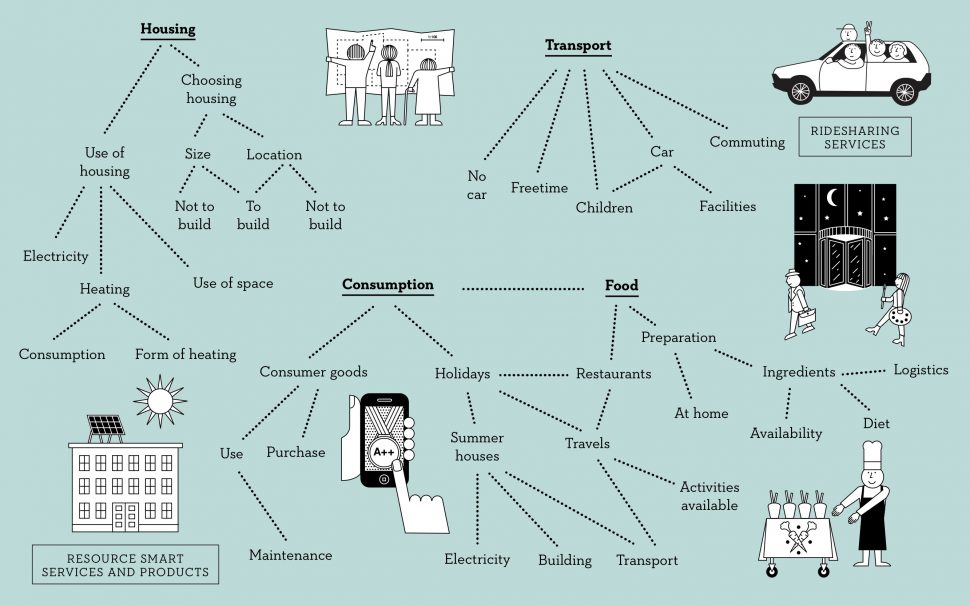This week Demos Helsinki is attending Global Climate Action Summit (GCAS) in San Francisco, California. This article is our contribution for the discussion on the future of global climate action, based on the work by Demos Helsinki over the course of the past decade. There has been a long debate…
This week Demos Helsinki is attending Global Climate Action Summit (GCAS) in San Francisco, California. This article is our contribution for the discussion on the future of global climate action, based on the work by Demos Helsinki over the course of the past decade.
There has been a long debate over whether climate change mitigation should start top-down (global agreements, market mechanism and regulation) or bottom-up (consumer choices by individuals). It is easy to ridicule random consumer choices because quite often their contribution to global emissions reductions is minuscule. As easy it is to note how little has been achieved in +20 years of global climate agreements.
The answer should be that we need both but in cycles: politics should indicate that there is a willingness to amend macro-level rules but politicians won’t be re-elected unless people feel that they are being engaged to an implementation of this goals. And conversely: Once people and businesses are creating and adopting new solutions, politicians gain the courage to take bigger leaps in policies.
This is what has gradually happened in various countries, states and cities: Radical long-term emissions reduction targets and climate neutrality goals have indicated that something is bound to happen in the political front.
Meanwhile, a wide variety of new consumer-level solutions have emerged and made it to mainstream markets: solar panel systems for homes, electric cars and new mobility services, advancements in building energy efficiency, the emergence of new plant-based protein products in consumer markets. The variety of options for climate-smart lifestyle choices has expanded radically within a decade and eventually growing number of people are actively shaping their lifestyle with help of these new goods and services.
At the same time, the companies behind these solutions are gaining attention as growing businesses and job creators. Then there is the group of proud professionals behind these success stories: real people who know the facts about climate emissions and ways of diminishing them, people who are also capable and willing to share and utilize their knowledge as citizens, outside their work.
This activity in workplaces, homes and market is also affecting the way politicians think: if people choose climate-smart ways of living, moving and eating in their everyday life, why wouldn’t that encourage politicians to support these options? This is what is bound to happen now.
The Gatekeepers of Climate-smart Lifestyles
We in Demos Helsinki initiated our work on climate-smart lifestyles and their gatekeepers a decade ago. We reasoned that there are a limited amount of relatively lifestyle choices that pretty much set the level of personal climate emissions: In what type of building you live in and where? How do you renovate your house? What type of mobility option you choose, what type of vehicle you buy? What type of diet do you choose? Where and how you choose to travel on your holidays?

Many of these choices you do only a couple of times in your life, many of them not more often than every few years. Usually, there is a certain type of professionals assisting in making this choice. If we can make those people see business opportunities in reducing climate emissions of their customers, then we have a rather solid and wide-ranging infrastructure for nudging critical lifestyle choices towards climate-smart direction.
In ten years our Peloton programme has contributed in:
1. Focusing attention on businesses and organizations that can help people to make major drops in their GHG footprints,
2. mainstreaming discussion on sustainable lifestyles,
3. framing the consumer cleantech as an attractive field of business, and
4. in demonstrating that this can be turned into a solid, growing business (new, regenerative circular economy, smartups as the most promising and radical domain of startups).
And actually quite many things have happened over the past decade, just think of what has happened in food, mobility, energy and smart cities. Think of Tesla, Whim, Pulled Oats, solar panels etc. Now the promising businesses are around things that can change lifestyles of people or change the ways built environment are being used.
And yet we know that this won’t be enough. Major political moves are required to make these options truly mainstream or secure that they spread fast enough to developing countries where emissions have soared the most over the past decade. After that remains even more challenging political decision: how to phase-out fossil fuels fast enough, how to help pension funds to divest their funds from biggest emitters, and how to enable the economy to adapt to that major change in finances?
Carbon Neutral by Default is becoming the new normal
Gradually the climate risks will be embedded in the value formation of companies assets, for example, real estate. For businesses, there are push and pull factors to act. Pull factors are the growing markets of developing new products and services to solve the climate crisis. The push factor comes from several directions. It’s not only that the customers want to buy sustainable products. The big institutional and private investors are growingly disinvesting from unsustainable businesses, most recently cities of London and New York.
Moreover, enlarging number of talented workforce weigh the mission of its employee higher than the pure paycheck. Lastly, the future local and global environmental laws will likely make those companies winners who have developed relevant competencies over time for the world of climate change, rather than trying to protect old vested interests of the old world. Because of these reasons, in a growing number of cases, it’s in the direct interest of businesses to be an active solver of the issue.
What we still need is a compelling vision towards carbon neutral society. Something that could carry through the transition and avoid social and political backlashes (the most carbon-intensive states voting Trump 2016). Some of the forerunner cities of course already have their goals for carbon neutrality, such as. Turku 2029 and Helsinki 2040.
Now the question is how to combine these two levels: gatekeepers and sustainable lifestyles with vision creating momentum for a fast transition. This combo is already happening on a city level (e.g. Smart&Clean of Helsinki metropolitan region) where long-term commitments and targets are being supported by an acceleration of diverse urban innovations. By indicating successful transformation towards carbon-neutral cities, lifestyles and thriving businesses we should be able to create momentum to bold political moves on the nation and global level.

Aleksi Neuvonen is the founder of Demos Helsinki. Follow Aleksi on Twitter: @leksis
